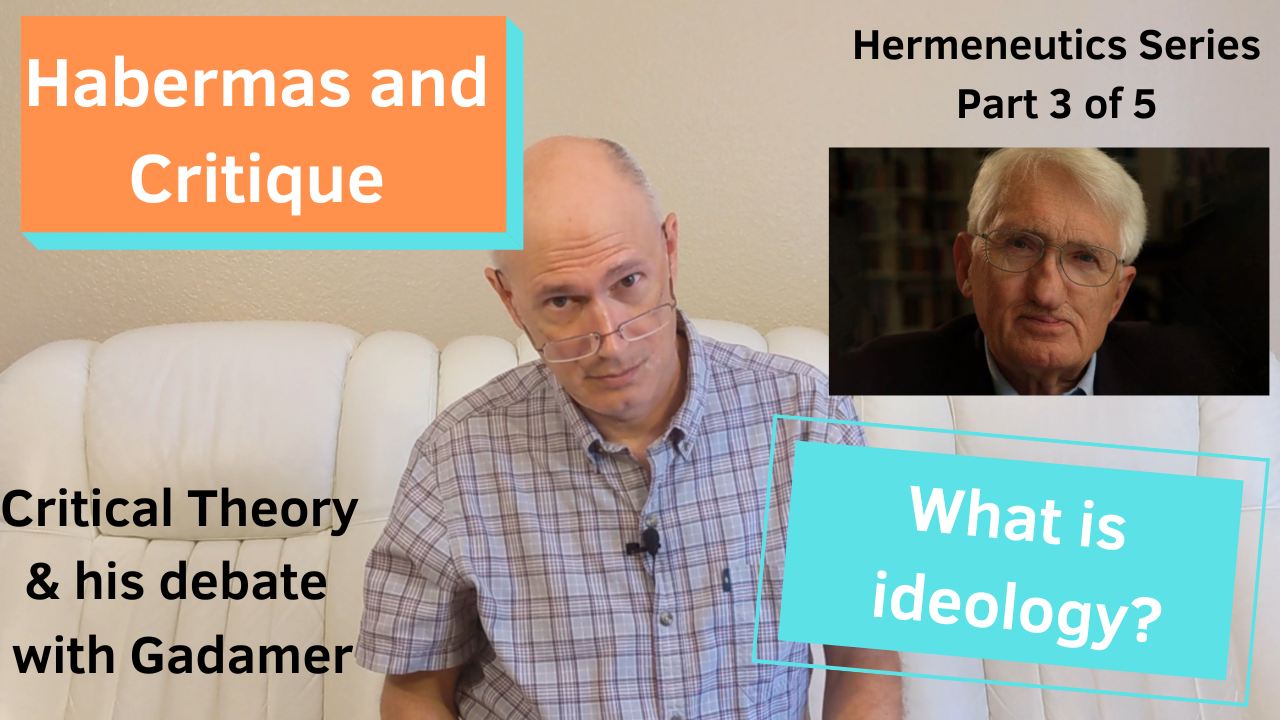09/07/2022 – Habermas and Critique: Hermeneutics Part 3

We’re going to talk today about Habermas, the Frankfurt school of critical theory, and the debate between Habermas and Gadamer. We’re also going to highlight a really juicy example from the gospel of Matthew. Juicy as in scandalous. You’re not going to want to miss this one. Stick around. This is TenOnReligion.
Hey peeps, it’s Dr. B. with TenOnReligion. If you like religion and philosophy content one thing I really need you to do is to smash that sub button because it really helps out the channel. The transcript is available at TenOnReligion.com and I also have a ko-fi linked in the description if you’d like to help out the channel and help me keep this baby going. By the way, as of the recording of this episode, no one’s really supported me yet.
This is the third part of our five-part series on hermeneutics, the art of interpretation and understanding. The first part was on the death of the biblical author and the second part was on Gadamer and dialogue. Later we’re going to get into Ricoeur and Levinas, but today, Habermas and critique. Let’s do this.
Jürgen Habermas is a German philosopher who is part of a specific school of thought called critical theory. So, in order to understand Habermas’ hermeneutics of interpretation and critique, as well as his later debate with Gadamer, we first have to relate a quick background on critical theory.
Critical theory has its roots in what is called the Frankfurt school, a somewhat informal and loose term designating a group of scholars who initially followed new interpretations of Marxist theories. They were either influenced by, or affiliated with, the Institute for Social Research at the University of Frankfurt in Germany starting in the 1930’s. The four main figures initiating the ideas of the Frankfurt school were Max Horkheimer, Theodor Adorno, Herbert Marcuse and Walter Benjamin. The overarching view that the Frankfurt school of critical theory held was that all human truths arise from one’s political and economic conditions. What we call truth always has a strategic aim and is thus always political. In critical theory, many things that are called truth are actually just ideologies created by the dominant class in any given society to serve and further their own interests as well as keep them in power. The dominant class does this by maximizing economic production for its own benefit and thereby needs to create a false consciousness in workers to make them believe what they are doing is worthwhile. For critical theory, this is exactly what the term ideology often refers to: a system of illusory or deceptive and distorted beliefs to fool workers and common people and shield them from what is really going on behind the curtain. The goal is to identify such ideologies, make people aware of them, and then free people from them. The aspiration is that the people should decide what things they need as well as the social relationships required to create those things rather than have such things being dictated to them by a dominant class. It’s like a large company fabricates a “need” and then magically invents a product to fulfill that “need” and then proceeds to use psychological methods to market it to the general public all for the purposes of keeping them flowing in money and power. Hello capitalism! Does this in any way sound familiar?
In this mindset, even though science may appear to be neutral in its methodology, it’s often not neutral in its implementation. Various subfields of science are utilized to maximize production by inventing more technologically efficient ways to produce goods and then psychologically control the minds of the common people through their created ideologies. They do this because they need workers. Workers are the “resources” needed to carry out the plan. Why does every workplace have a human “resources” department? Think about that for a minute. Dude… Capitalism, as an economic structure, then attacks all values and beliefs that stand in the way of its strategy of domination and control. This is accomplished through education, art, film, music, politics, you get the picture?
Okay, back to Habermas. He studied under these bros at the Frankfurt school and then used critical theory to instigate a little debate with his German fellow scholar Gadamer. If haven’t watched the previous episode on Gadamer and dialogue or are unfamiliar with his thought, then you need to go watch that first or this next part might be a little confusing. Basically, Habermas lofted three points of critique against Gadamer’s model of hermeneutics. First, the deferral to tradition. Gadamer viewed tradition optimistically, even going so far as to redefine the term “prejudice” as pre-understanding in a positive manner. For Gadamer, a horizon is the background upon which one draws to understand the past in any form. Habermas had major concerns with describing the hermeneutical process in this way because tradition might be a possible carrier of ideology. How do we know that we’re not being duped by the dominant class? How do we know that the intentions of those who created and continue to maintain the tradition are not oppressive to us?
Second, historically-effected consciousness. Remember that Gadamer’s concept of historically-effected consciousness meant that for every piece of historical data there also exists everything that everyone has ever said or written about those historical things. This is compounded into an ever-ongoing process such that our consciousness is effected by that history of interpretation, or more precisely, molded and shaped. This significantly affects the way we possibly could understand anything without even realizing it. Gadamer seems correct in his explanation of historically-effected consciousness, so why did Habermas take issue with it? The reason was that the content of historically-effected consciousness – all of the interpretations that constantly get added to our understanding of any given person, event, or text in history – are not just naturally there. They exist in our understanding through a process of socialization and mass education. And guess what? Socialization and mass education are the two most common delivery mechanisms for ideologies. This is how generations can be duped into buying Coca-Cola without realizing that basically all medical professionals constantly state that there aren’t many chemical substances in that product which are actually helpful to the human body. Substitute Coca-Cola for any number of bad ideologies – white supremacy, gender superiority, religious intolerance…
Third, interpretation as dialogue. In dialogue we are both the subject and the object simultaneously. According to Gadamer, we participate in bringing the present significance of historical data into life through the fusion of horizons. But for Habermas, where is the tool by which to critique this? How are we to resist potentially oppressive prejudices implanted within the tradition or traditions of our dialogue partner, be it an interpretation of a person, event, or text? If one says that there is no ideology present, Habermas would point out that the denial of ideology is often a part of how ideology is used. As the old saying goes, the best trick the devil ever pulled off was convincing people that he didn’t exist. Like when one makes one’s own ideology appear to be necessary or natural. Decades ago, when I was growing up the Chevrolet automobile company had a huge market share in the United States and they ran television commercials stating that they were the “heartbeat” of America. Like, everyone needs a heartbeat, right? It's just natural to be American and buy a Chevy. But to be fair to Gadamer, he replied that the authority of tradition is not absolute. It can and should be questioned in certain times, but he wasn’t really clear on when and how to do that and this was part of Habermas’ concern.
This is where Habermas goes a step further than Gadamer because even though Gadamer does stress the practical application of hermeneutics, Habermas stresses more of an ethical approach by asking how would this ideology affect other people? Hermeneutics, for Habermas, should be an intersubjective process whose aim or goal is mutual betterment for all parties involved.
One hugely important religious example from the New Testament will make this painfully clear. Near the end of the gospel of Matthew, the Jewish leaders are depicted as persuading the Jews to request Pilate to release Barabbas and crucify Jesus. [Matthew 27:20-23] The narrative indicates that after Pilate declared himself innocent of Jesus’ blood, the Jewish crowd then replied by shouting that Jesus’ blood will be on us and our children. [Matthew 27:25] Since this narrative was likely written by a Jewish community somewhere in the Roman Empire living 40-50 years after Jesus’ execution by the Roman leadership in Jerusalem, why is this scenario included in the narrative? Because it was written after the destruction of the Jewish Second Temple in the year 70 CE. What does it all mean? This is where hermeneutics, the art of interpretation and understanding, comes into play. Historians believe that when the gospel of Matthew was composed there were strong tensions between the Jewish community that composed this gospel and other Jewish communities in the area. The Matthean Jews believed that Jesus was the Messiah and other communities did not. We don’t have time to fully explain what the Messiah concept meant to Jews during that era, but clearly there was rising hostility between these Jewish groups. The Matthean Jews were accusing other Jewish groups that by not believing as they did, they brought the destruction of the Temple, the central focal point of their worship, upon all Jews by crucifying Jesus. Even though Romans executed Jesus, not Jews, it is an attempt by the Matthean Jews to shame other Jews into what they felt was the correct messianic belief. For thousands of years this has been misinterpreted and thus misunderstood by Christians with enormous consequences of many lives. So, does Habermas have a valid concern about hidden ideologies in tradition? I’m pretty sure that would be a yes. Now you see how this is much bigger than just drinking Coca-Coca and driving Chevies around town.
Habermas then elaborated a hermeneutical theory of communicative action. In this theory, reason should be a shared, intersubjective practice leading to universal pragmatics. Universal in that it can be applied to all aspects of a society, and pragmatic in that hermeneutical interpretations lead towards human wellness and justice. Now, a clear difficulty emerges in that not all people in a society may want to participate in such a process. When dialogue occurs in good faith, meaning both parties are both willing to convince and are willing to be convinced, this might work. But folks who have power rarely want to give it up, at least not that easily, even with good cause. So, if Gadamer deferred to the authority of tradition and Habermas insisted that tradition be subordinated to critical theory and the reason of a community, where does that leave us? It leads directly into our next figure who attempted to bridge the gap: Paul Ricoeur. Did you see that one coming?
Okay, I hope you’ve enjoyed this investigation into Habermas and critique. Leave a comment below and let me know if you felt like you’ve ever been under the influence of hidden ideologies. Coming up in part four in our hermeneutics series: Ricoeur and suspicion. Are you suspicious? You should be. Hehehe. Until next time, stay curious. If you enjoyed this, support the channel in the link below, please like and share this video and subscribe to this channel. This is TenOnReligion.


